Advertisement
Some progress has been made on the “complex” issues of maritime boundaries, water and airspace but Singapore and Malaysia are not ready to resolve all of them yet, says Singapore PM Lawrence Wong.
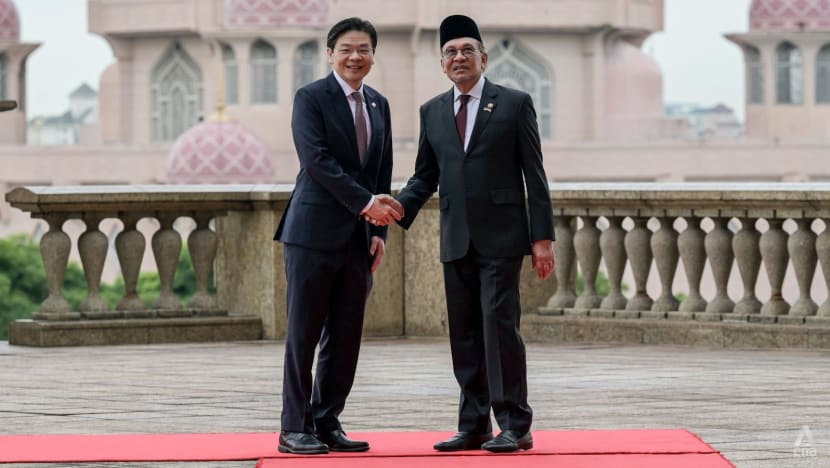
New: You can now listen to articles. 
This audio is generated by an AI tool.
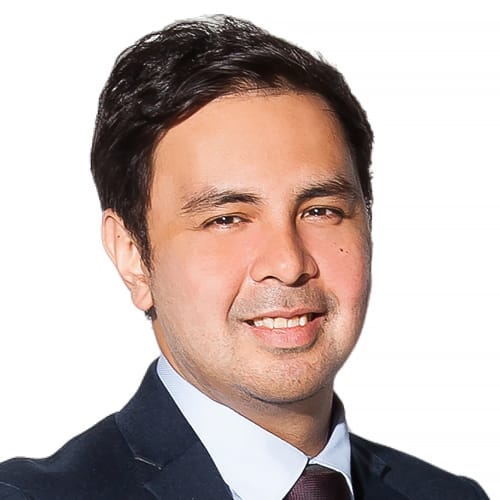
07 Jan 2025 02:14PM (Updated: 07 Jan 2025 02:56PM)
JOHOR BAHRU: Singapore and Malaysia are committed to durable and win-win outcomes on the “complex” outstanding bilateral issues involving airspace, maritime boundaries and water, even as more time is needed to resolve them, said the prime ministers of both countries on Tuesday (Jan 7).
The unresolved matters should not detract from their overall relationship, and bilateral cooperation must continue to deliver concrete benefits to the people of both countries, said Singapore Prime Minister Lawrence Wong at a joint press conference at the 11th Malaysia-Singapore Leaders’ Retreat in Putrajaya.
The “final settlement” of these issues should be “win-win”, and they should not detract from or frustrate progress in key areas like economic, trade and energy cooperation, said Malaysia Prime Minister Anwar Ibrahim.
The two-day retreat in Malaysia is Mr Wong’s first since taking over from Mr Lee Hsien Loong last May, but the pair have met “many times” since his introductory visit last year, said Mr Wong.
Both leaders said they have instructed their respective officials to meet and discuss the issues.
“We agreed that … on a quarterly basis we should have some form of short meeting to review (the progress of this). And this may compel our technical team, the experts, to deal with (the issues) expeditiously,” said Mr Anwar.
“They have had good discussions. Some progress has been made, but we are not ready to resolve all of them yet, because they are complex,” said Mr Wong.
“While we would like the resolution to be expeditious, I think it’s also important that we give time for the officials to meet, talk to one another, understand each other’s positions and come up with an agreement and an outcome that is durable and that is beneficial for both sides,” he added.
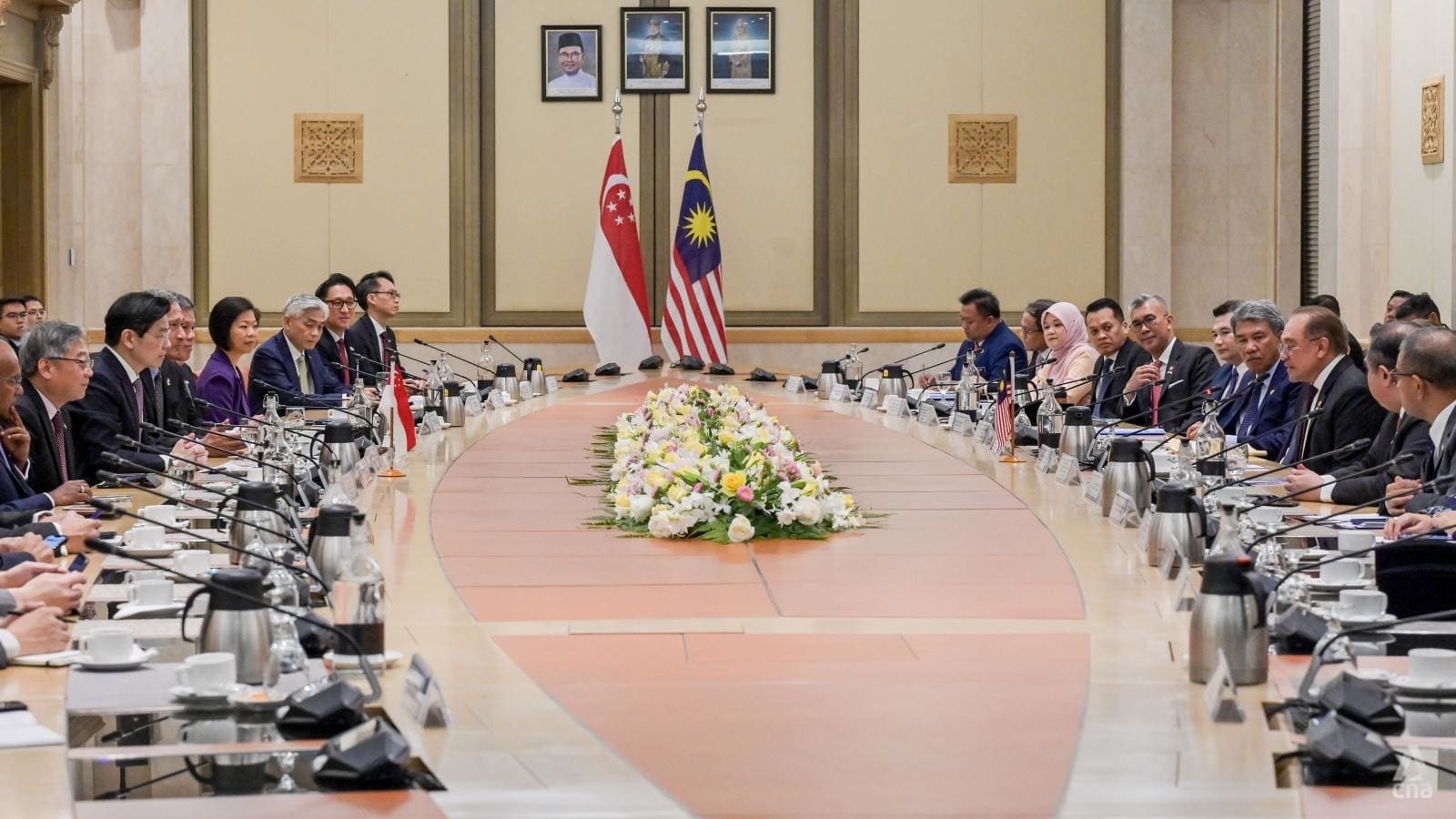
Amid these “good-faith” discussions, both sides are still able to move forward on projects including the Johor-Singapore Special Economic Zone and the Johor Bahru-Singapore Rapid Transit System (RTS) Link, said Mr Wong.
“Where these issues are concerned, we are fully committed to discussing them constructively, holistically, and I am confident that in time to come, we can achieve durable and mutually beneficial outcomes across all of them,” he said in response to a question on what the challenges were to a faster resolution.
OUTSTANDING BILATERAL ISSUES
The issue of maritime delimitation relates to overlapping port claims, which both countries agreed in 2019 to suspend and to revert to former limits.
The suspension followed a dispute sparked by Malaysia’s unilateral extension of the Johor Bahru Port Limits off Tanjung Piai, which overlapped with Singapore’s port limits off Tuas.
Singapore protested Malaysia’s extension in October 2018, saying it resulted in Malaysian government vessels making repeated incursions into Singapore waters, with the Republic later extending its own port limits in response, which were still in its territorial waters.
Both sides agreed in 2019 not to authorise and to suspend all commercial activities in the area, and not to anchor any government vessels there.
A committee was set up to study the legal and operational issues relating to the maritime dispute to provide a basis for negotiations.
On airspace, Malaysia has said it is ready to manage its airspace over southern Johor after delegating the task to Singapore 45 years ago.
In 2018, Malaysia objected to new flight procedures proposed for Singapore’s Seletar Airport and its transport minister Anthony Loke said Malaysia has informed Singapore it wants to take back the airspace in phases.
Singapore’s Ministry of Transport (MOT) responded, saying the Republic respects Malaysia’s sovereignty and that cross-border airspace management “is not incompatible with sovereignty”.
At the 10th Singapore-Malaysia Leaders’ Retreat held in Singapore in October 2023, Mr Anwar and then-Singapore prime minister Lee agreed to review the delegation arrangements for the provision of air traffic services over southern Peninsular Malaysia, which were recommended and approved by the International Civil Aviation Organization in 1973.
On Tuesday, Mr Anwar said his discussions with Mr Wong recognised the needs of Malaysia in terms of its connectivity with Sabah and Sarawak. At the same time, they recognised the requirements of Singapore to ensure that the performance and activities at Changi Airport are unaffected and facilitated.
Meanwhile, water has been a constant source of political wrangling between Singapore and Malaysia over the years, especially when Malaysia’s longest-serving prime minister Dr Mahathir Mohamad was in office.
Most recently, however, a Malaysian deputy minister said the country, as well as its southern Johor state, would not be renegotiating raw water rates with Singapore yet.
“Following discussions in October 2024 with the Johor chief minister (Onn Hafiz Ghazi) and the ministry, it was decided that the review of raw water rates does not need to be negotiated at this time,” Malaysia’s Deputy Energy Transition and Water Transformation Minister Akmal Nasrullah Mohd Nasir told parliament on Dec 2.
The 1962 Johor River Water Agreement entitles Singapore to draw up to 250 million gallons a day (mgd) of water from the Johor River.
Singapore pays 3 Malaysian sen per thousand gallons of raw water and sells treated water back to Johor at 50 sen per thousand gallons, a fraction of the cost of treating the water.
While Johor is entitled to a daily supply of up to 5mgd a day of treated water, which accounts for 2 per cent of the water supplied to Singapore, Singapore has been supplying 16mgd of treated water to Johor at its request.
Collapse Expand
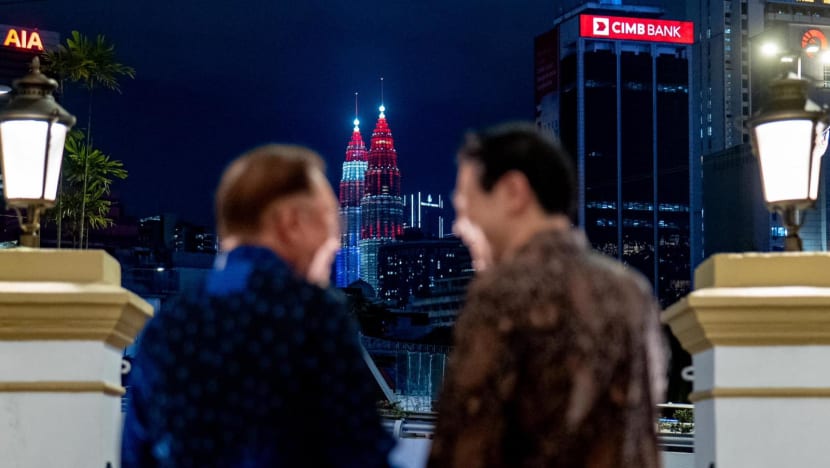
SINGAPORE, MALAYSIA ARE IMPORTANT ALLIES: PM ANWAR
Mr Wong and Mr Anwar also pointed to their strong friendship at Tuesday’s press conference.
“We have built up a very strong understanding, friendship, a relationship built on trust with one another, and that anchors our bilateral relationship as well,” said Mr Wong.
“So this retreat is a useful opportunity to strengthen our friendship even further. We both agree on a shared vision of growing connections and connectivity between our two countries,” he added.
Mr Anwar said he was pleased both sides have expanded cooperation into new areas like education, energy and investments.
“We regard Singapore, not only as a neighbour, but (as a) very important ally, and (are) committed to enhancing bilateral relations. And we have seen various achievements in all fields of endeavour,” said Mr Anwar.
The Leaders’ Retreat is an annual platform for the leaders of both countries to set the overall direction for bilateral cooperation.
On Monday, Mr Wong was hosted to dinner by Mr Anwar at Rumah Tangsi, a two-storey yellow mansion with European-style architecture that is a national heritage site.
They viewed a special light-up of the Petronas Twin Towers, in the colours of the Malaysia and Singapore flags, to commemorate the good relations between both countries.
On Tuesday morning, Mr Wong was received by Malaysia’s king Sultan Ibrahim Sultan Iskandar.
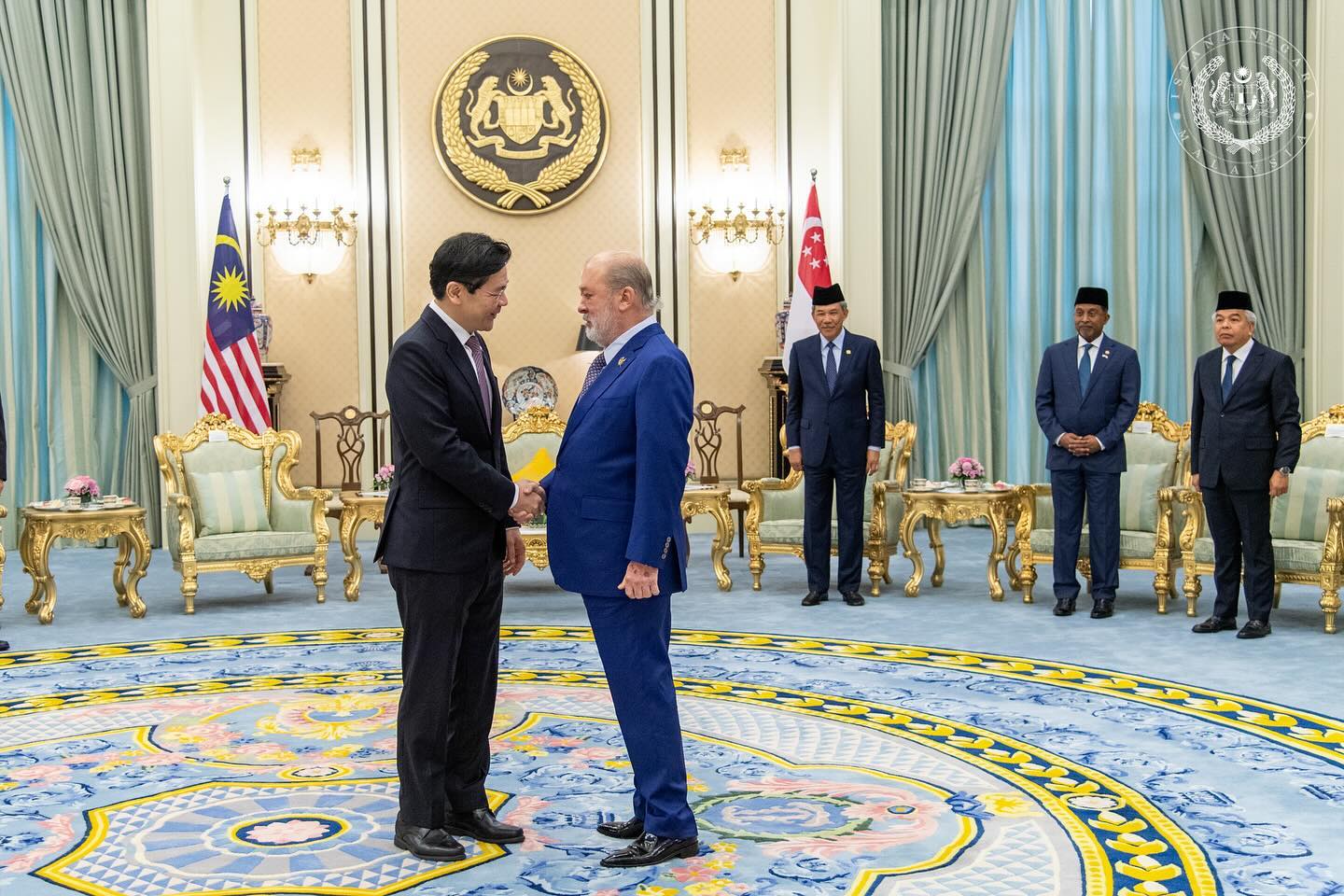
He also attended an official welcome ceremony at Perdana Putra Complex, followed by a meeting with Mr Anwar and their delegations.
Both prime ministers witnessed the exchange of bilateral agreements and memoranda of understanding across various domains, including an agreement on the Johor-Singapore Special Economic Zone (JS-SEZ).
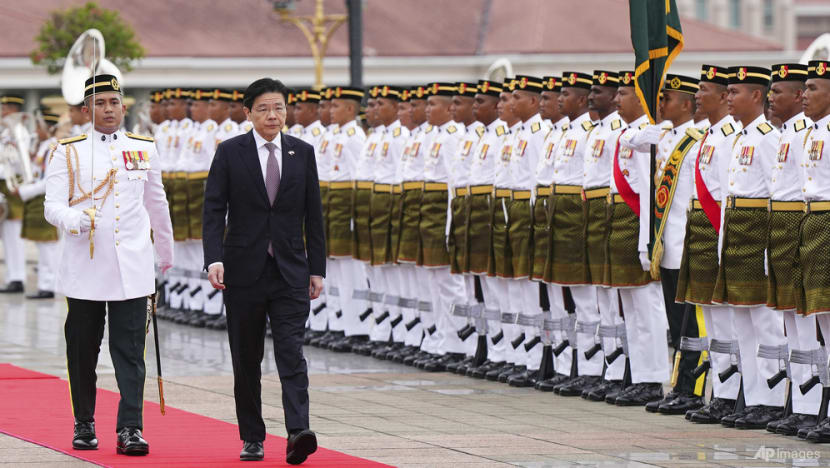
Asked by a journalist from Malaysian news agency Bernama about the High-Speed Rail (HSR) project to link Singapore and Kuala Lumpur, Mr Wong said Singapore is open to listening to new proposals from Malaysia, “starting from a clean slate”.
“That’s our position, because from our point of view, greater connectivity between our two countries is always a plus,” he said.
Mr Anwar said that the Malaysia government is inviting “full participation” of the private sector on the HSR project. This is because it has financing “limitations” due to key priorities this term that include alleviating poverty, flood mitigation and public health.
“For the next one or two years, the mega projects are going to be deferred, primarily because of this commitment to settling some of the outstanding issues … but we are still waiting for some promising and positive contribution by the participation by the private sector to proceed when necessary,” said Mr Anwar.
The proposed 350km rail link between Kuala Lumpur and Singapore was first proposed in 2013, and a binding agreement was inked in December 2016 to have the line operational by 2026.
It was discontinued after multiple postponements at Malaysia’s request and the agreement lapsed in December 2020, with Malaysia paying more than S$102 million (US$75.8 million) in compensation to Singapore for the termination.
Talk of resurrecting the project – which aims to reduce travel time between Kuala Lumpur and Singapore to 90 minutes from more than four hours by car – gained momentum after Mr Anwar took power in November 2022.
Most recently, Malaysia has estimated the project would cost RM100 billion today and the government has said funding would have to come totally from the private sector.

Comments are closed.